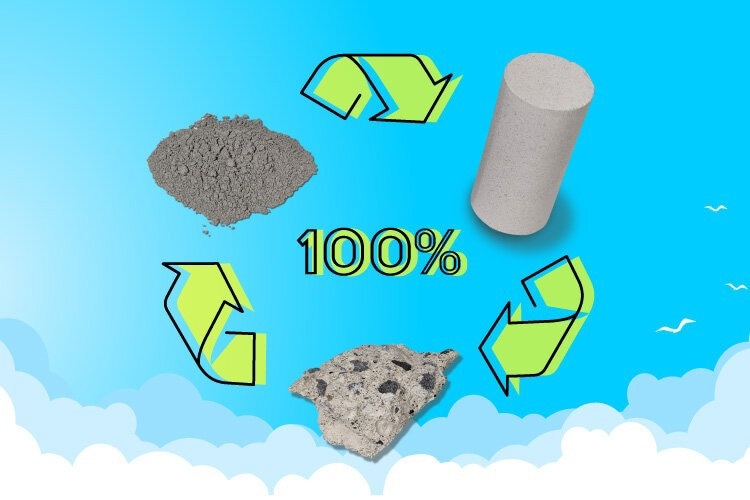Concrete has been used in buildings, bridges, and other constructions for centuries because of its tremendous strength and ease of production. Nevertheless, the manufacture of cement is responsible for about 8% of worldwide carbon emissions. As a result, continual efforts are being made to reduce this enormous carbon impact.

Image Credit: Institute of Industrial Science, The University of Tokyo
Reusing concrete scrap is a key component of some of these pollution control initiatives. For instance, Japanese researchers recently invented high-pressure compaction as a simple method of recycling concrete. However, more development is required for these items to be used to their full potential.
Researchers from the Institute of Industrial Science at The University of Tokyo have now validated experimentally the changes in compressive strength and fine-scale structure that are caused by heat treatment after such compaction. The research was recently published in the Construction and Building Materials journal.
This research will contribute to the enhancement of recycled concrete’s qualities and the sustainability of the building sector.
It has been suggested that heat treatment could increase the effectiveness of high-pressure compaction. Results, however, have been inconsistent, ranging from deteriorated to improved quality.
We sought to add clarity to this debate. By systematically studying common heat treatment conditions and the corresponding microstructure, we have rigorously evaluated the improved properties of the resulting concrete product.
Md. Ibrahim Mostazid, Study Senior Author, Institute of Industrial Science, University of Tokyo
The investigators used blends of recycled portland cement concrete with additions of iron, steel, and blast furnace slag. Three popular post-compaction heat treatments were put to the test. The microstructural reorganizations brought about by the heat treatments all led to better characteristics.
The density and fine-scale uniformity of the concrete was also raised by adding slag, which further enhanced its characteristics. For instance, post-compaction autoclaving at 180 °C for 8 hours boosted one concrete mixture's compressive strength by >5× compared to no autoclaving. In other words, researchers have designed a method for enhancing concrete recycling that uses less energy.
Different thermal treatments improved the strength of the concrete, but by different mechanisms. For example, autoclaving the concrete corresponded to hydrogarnet production, a different mineral than what we observed after simple heat treatments.
Md. Ibrahim Mostazid, Study Senior Author, Institute of Industrial Science, University of Tokyo
Researchers will be able to contrast this data with the outcomes of their own concrete recycling initiatives, like steam curing, in the future. By doing this, tests of recycled concrete’s performance will have precise numerical and microstructural reference points.
With these standards in place, researchers will be able to compare various approaches that share the same environmental sustainability objectives and reduce the carbon footprint of the building sector.
Journal Reference:
Mostazid, M. I., et al. (2022) Effect of thermal treatment on strengthening recycled compacted concrete incorporating iron, steel, and blast furnace slag. Construction and Building Materials. doi.org/10.1016/j.conbuildmat.2022.128623.
Source: https://www.iis.u-tokyo.ac.jp/en/